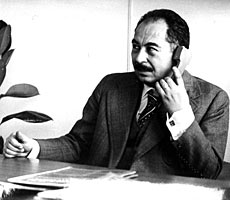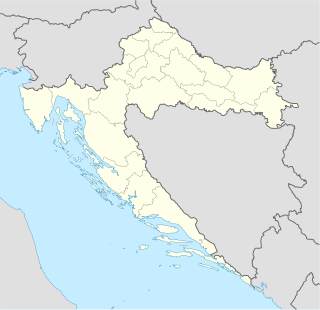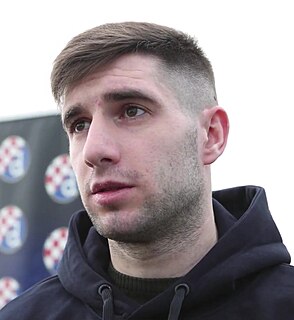Related Research Articles

The president of Croatia, officially denoted as the President of the Republic of Croatia, is the head of state, commander-in-chief of the military and chief representative of the Republic of Croatia both within the country and abroad. The president is the holder of the highest office in Croatia. However, the president is not the head of the executive branch as Croatia has a parliamentary system in which the holder of the post of prime minister is the most powerful person within the country's constitutional framework and everyday politics.

Ivo Sanader is a Croatian politician who served as Prime Minister of Croatia from 2003 to 2009. He is to date the longest-serving prime minister since independence, holding the office for over five and a half years before resigning in July 2009. He is the only Croatian prime minister to serve more than one term, winning general elections in 2003 and 2007. Along with Ivica Račan, he is one of only two prime ministers to have been at the head of more than one government cabinet, chairing his first cabinet from December 2003 until January 2008, and his second cabinet from January 2008 until his resignation in July 2009.

Lesbian, gay, bisexual, and transgender (LGBT) rights in Croatia have expanded in recent years, but LGBT persons may still face some legal challenges not experienced by non-LGBT residents. The status of same-sex relationships was first formally recognized in 2003 under a law dealing with unregistered cohabitations. As a result of a 2013 referendum, Croatia's Constitution defines marriage solely as a union between a woman and man, effectively prohibiting same-sex marriage. Since the introduction of the Life Partnership Act in 2014, same-sex couples have effectively enjoyed rights equal to heterosexual married couples in all aspects except full adoption rights, where a "partner-guardianship" was introduced to provide same-sex couples with a mechanism similar to step-child adoption. Croatia bans all discrimination on the grounds of sexual orientation, gender identity, and gender expression. Croatia has the most advanced LGBT rights in the Slavic World according to ILGA-Europe.

Branimir Glavaš is a Croatian former major general and right-wing politician. He was one of the founders of the Croatian Democratic Union (HDZ) party which was in power in the 1990s and one of its key figures until a split in 2006. In 2009 he was found guilty for war crimes.

Statehood Day is a holiday that occurs every year on 30 May in Croatia to celebrate the constitution of the first modern multi-party Croatian Parliament in 1990. The Statehood Day is the National Day of Croatia, being both an official holiday and a day off work.

Stjepan Đureković was a Croatian political dissident and businessman who was assassinated by the Yugoslavian State Security Administration (UDBA) in West Germany in 1983. He was previously the CEO of the state-owned INA petrol company. In 1982, he defected to West Germany and became active in Croatian émigré circles opposed to Yugoslavia.
Emir Hadžihafizbegović is a Bosnian actor. Often regarded as one of the best Bosnian actors, he has appeared in over fifty films including When Father Was Away on Business (1985), Remake (2003), Fuse (2003), Days and Hours (2004), The Border Post (2006), Grbavica (2006), Armin (2007), Vegetarian Cannibal (2012), These Are the Rules (2014) and Quo Vadis, Aida? (2020).

The Croatian Parliament electoral districts are the special territorial subdivision of Croatia used for the country's parliamentary elections.

The Bučje camp was an internment camp run by rebel Croatian Serb forces during the early stages of the Croatian War of Independence. Located in the village of Bučje near Pakrac, the camp was used for the imprisonment of 200–300 Croatian civilians, prisoners of war, other non-Serbs, as well as Serbs that sided with the Croatian government or refused to join Serbian paramilitary groups. The camp was the site of numerous war crimes including murder, rape and torture. Twenty-two detainees are still listed as missing as of December 2013.

Presidential elections were held in Croatia on 28 December 2014 and 11 January 2015, the sixth such elections since independence in 1991. Only four candidates contested the elections, the lowest number since 1997. Incumbent President Ivo Josipović, who had been elected as the candidate of the Social Democratic Party in 2009–2010 but ran as an independent, was eligible to seek reelection for a second and final five-year term. As no candidate received 50% of the vote in the first round in December 2014, a run-off took place in January 2015 between the two candidates with the most votes; Josipović and Kolinda Grabar-Kitarović. Grabar-Kitarović went on to win the elections by a slim margin of 32,509 votes or 1.48%, making her Croatia's first female president.
Croatian Dawn – Party of the People was a minor Croatian conservative political party established in July 2013. Party's founder and leader was Milan Kujundžić.

Forward Croatia - Progressive Alliance was a centre-left political party founded by former Croatian President Ivo Josipović.
Thomas Crowley was an Irishman who fought in the Croatian War of Independence.

Luka Ivanušec is a Croatian professional footballer who plays as an attacking midfielder for Dinamo Zagreb in the Prva HNL.
Mia Dimšić, known professionally as Mia, is a Croatian singer and songwriter.
Dario Juričan is a Croatian film director, producer, and political activist. In 2019, he briefly changed his legal name to Milan Bandić. Although he has written, directed and produced several fictional short films, he is best known for his feature documentary films Gazda and Gazda: Početak, which examine Croatian businessmen Ivica Todorić and Miroslav Kutle.

Albina Grčić, known professionally by the mononym Albina, is a Croatian singer. She began her career after participating in season three of The Voice Hrvatska where she finished third. She will represent Croatia at the Eurovision Song Contest 2021 in Rotterdam with the song "Tick-Tock".
References
- ↑ Kazneni zakon, 2011, IV. Kazne, article 40. Vrste kazni
- 1 2 Kovčo Vukadin, Irma; Žakman-Ban, Vladimira; Jandrić-Nišević, Anita (2010). "Prisoner Rehabilitation in Croatia" (PDF). Varstvoslovje, Journal of Criminal Justice and Security. Faculty of Criminal Justice and Security, University of Maribor. 12 (2): 143–162. ISSN 1580-0253. Archived from the original (PDF) on 5 December 2011. Retrieved 1 December 2010.CS1 maint: discouraged parameter (link)
- 1 2 Kazneni zakon, 2011, IV. Kazne, article 46. Kazna dugotrajnog zatvora
- ↑ "Psiho je ubio troje ljudi, a iz Lepoglave bi trebao izaći tek 2048". Večernji list (in Croatian). 22 July 2015. Retrieved 7 September 2017.CS1 maint: discouraged parameter (link)
- 1 2 3 Dražić, Milena (7 May 2009). "'Mi smo uveli doživotnu kaznu, a HDZ je ukinuo'". dnevnik.hr (in Croatian). Retrieved 1 December 2010.CS1 maint: discouraged parameter (link)
- ↑ Marković, Ivica (23 May 2009). "Marija Definis-Gojanović: Naše su ćelije mučne za doživotne robijaše". Slobodna Dalmacija (in Croatian). Retrieved 1 December 2010.CS1 maint: discouraged parameter (link)
- ↑ "Treba li Hrvatska uvesti doživotni zatvor?". Index.hr (in Croatian). 15 June 2019. Retrieved 8 February 2021.CS1 maint: discouraged parameter (link)
- ↑ "Oni su u klubu 40: Do sada izrečeno 14 maksimalnih kazni". Večernji list (in Croatian). 19 October 2012. Retrieved 19 October 2012.CS1 maint: discouraged parameter (link)